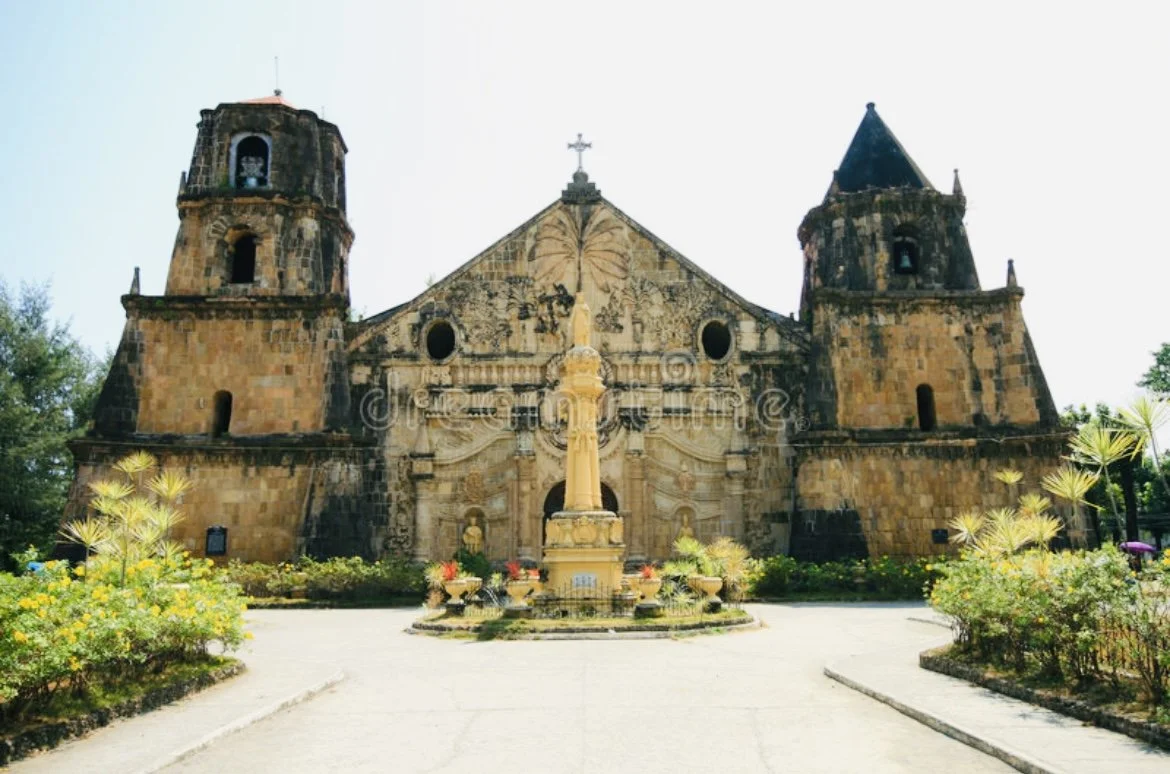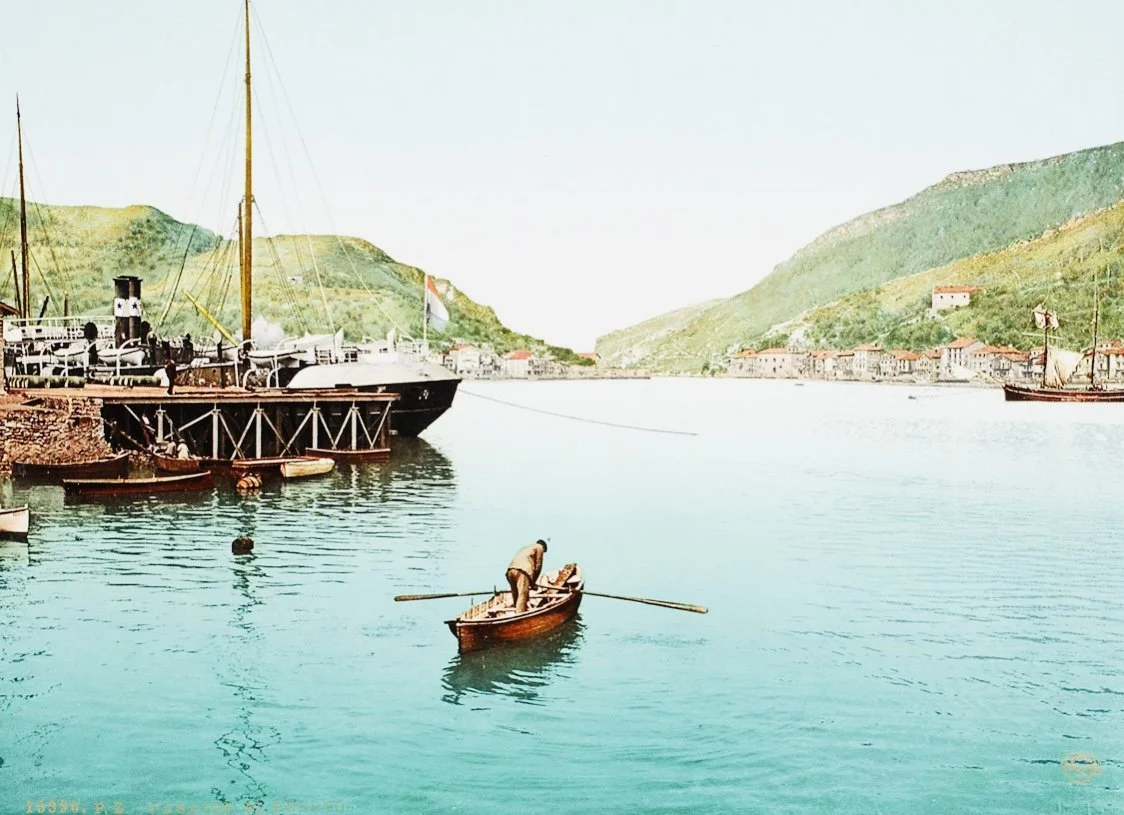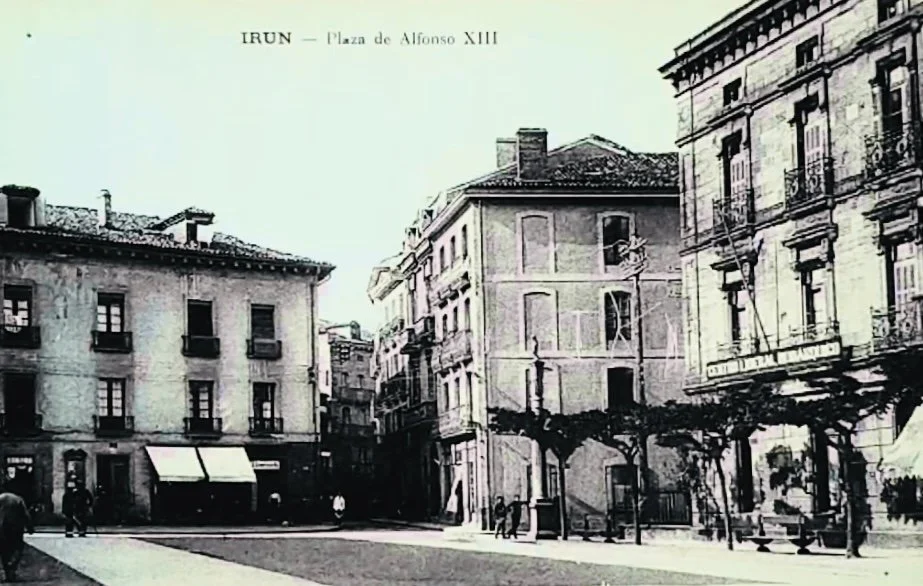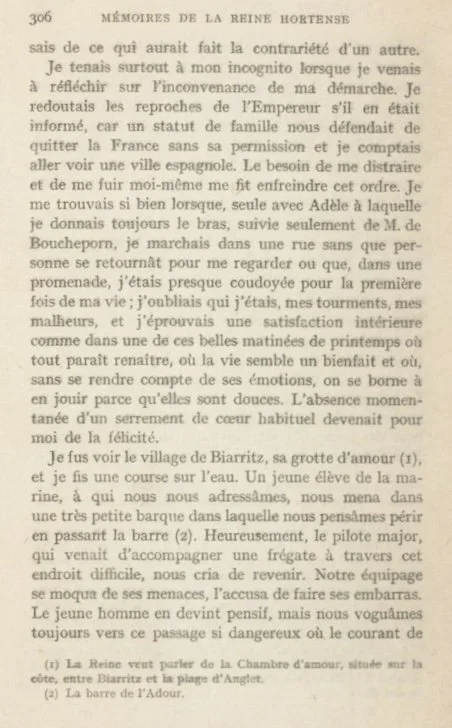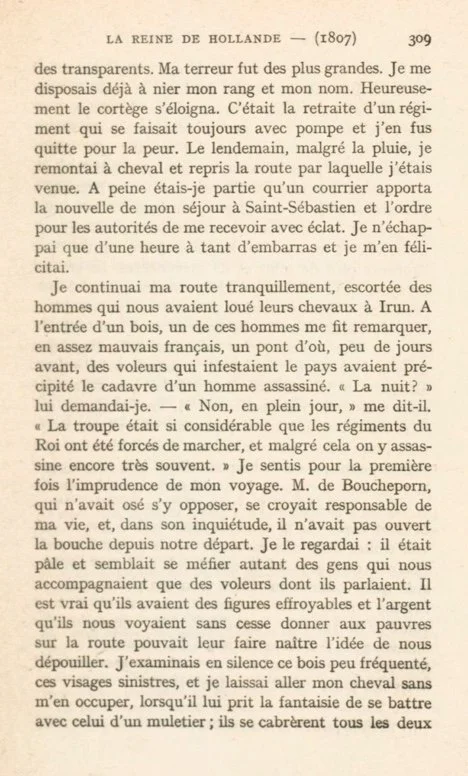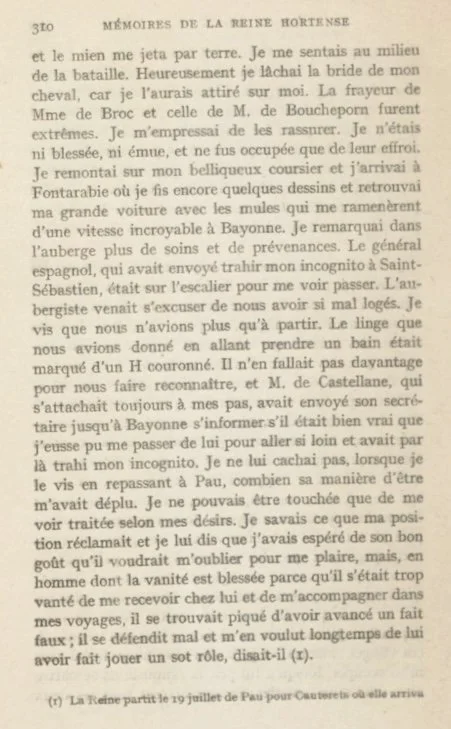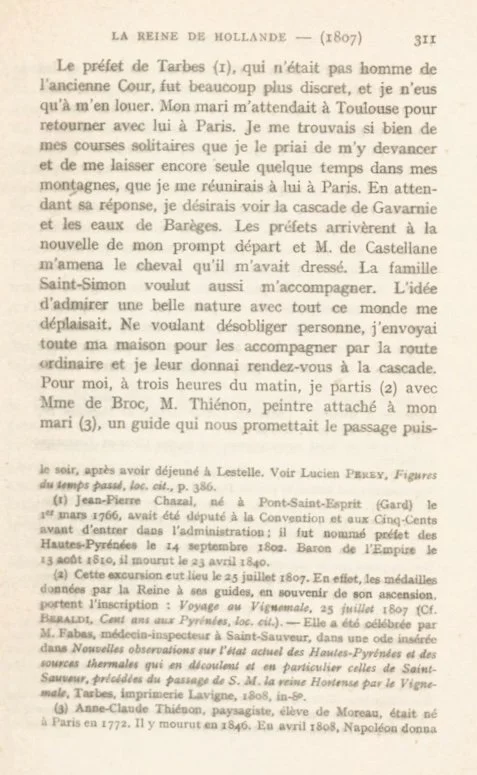Let’s have another look at Hortense’s Memoirs. If you want to read the book it is available for free at the side bar in English and French. Use the widget on the sidebar to translate the text below into pretty much any language.
Hortense was forbidden from leaving France and she went to Spain anyway and put herself into dangerous situations.
Hortense’s memoirs continues:
I had the greatest difficulty to make him [the prefect] grasp that what I wanted was to be left alone. I did not tell him the purpose of my trip or even my actual destination. He believed I was returning the next morning to Cauterets, instead of which I continued on to Bayonne.
My luggage consisted of three bags and saddles piled into a hired carriage. At the inn our reception was by no means a warm one. The best suite was reserved for a Spanish general, and the accommodations offered us were extremely second-rate. Presumably they were quite good enough for people arriving in such a shabby vehicle. The worse my reception the better I was pleased, and I was delighted with what would have annoyed anybody else.
When I stopped to think of the unconventional manner in which I was behaving I dreaded the Emperor's reproaches if he heard about my trip, for a family agreement forbade us leaving France without his permission, and I intended to go on and see a Spanish city. It was the need of occupying my thoughts and escaping introspection that caused me to violate this agreement.
I was so happy when, alone with Adele, whose arm I always took, and followed only by Monsieur de Boucheporn I walked along a street without anyone turning to stare at me, or when, during my walks, for the first time in my life I found myself jostled by the crowd. I forgot who I was, I forgot my torments and my misfortunes; and I left for Spain in an old-fashioned carriage that might have dated from the days of the Goths. It was drawn by six mules.
At Irun I was astonished to note the difference that existed between the two countries which lie side by side. Their frontiers are more clearly defined by the customs of the inhabitants than by the Bidassoa River. I had never seen a priest wearing his robes walk about in the streets. In Spain the entire population seemed to live as though they were inside a monastery. I hired riding-horses at Irun and made my way by bridle-paths to the port of Passajes, one of the most beautiful sites in the world. Everywhere I went I made sketches, everywhere I visited the churches. In one chapel I caught sight of a woman prostrating herself with the greatest abandon. I could not yet understand this perpetual adoration of the Divinity or even this need of communicating with Him by vague prayers having no particular object.
Such complete humility seemed to me to be a sign of remorse. I looked at the woman with sympathy and pity. "She must have committed some great sin," I said to Adele. "Poor woman, she is more to be pitied than I."
Another time I saw an old crone who looked so wretchedly poor I was convinced she must be asking God to bestow alms on her. I gave her money and felt that my surmise was correct when, instead of thanking me, she again fell on her knees praising God for having answered her prayer.
Certain now that I had interpreted her supplications correctly, I gave all the money I had with me and in doing so experienced once more a feeling of true contentment. I went to visit a monastery of Capuchin monks, believing that we should be admitted. They all came to examine us, but we were not allowed to cross the threshold.
I was no more fortunate when we stopped at the nunnery of a very severe religious order. In spite of our riding-habits they all asked us if we were not French nuns whom the Revolution had driven from our own country.
Probably this was because it was difficult for them otherwise to understand the interest we displayed, which must have seemed extraordinary. At San Sebastian I visited all the points of interest. I climbed up to the fort, from which one has a view of the two greatest beauties of nature, the sea and the hills. I had expected to return the same day to Bayonne, but the tide which leaves the port of Passajes nearly dry prevented me from doing so, and I was obliged to spend the night at San Sebastian. I was terrified at the idea that I might be recognized. Suddenly, martial music was heard, and a crowd appeared, accompanying a number of people bearing transparencies. My terror increased. I was already prepared to deny my name and rank.
Fortunately, the procession moved on. It was the evening parade of a regiment stationed in the town, and a ceremony always carried out with much pomp. The next day in spite of the fact that it was raining I remounted my horse and returned by the road along which I had come. Hardly had my departure taken place when a messenger brought the news of my visit and an order to receive me with the proper ceremony. I escaped all this fuss by scarcely an hour and was delighted to have done so.
We continued our journey accompanied only by the men from whom we had hired the horses at Irun. As we were entering a wood one of these men, speaking in rather bad French, indicated a bridge from which a few days before the robbers who infested the region had thrown the body of a traveler whom they had murdered. "Did this take place at night?" I inquired.
"No, indeed, in broad daylight," he replied. "Brigands are so numerous that the authorities are obliged to employ regiments of the regular army against them. Even that does not prevent many murders being committed."
Hearing this I understood for the first time how imprudent I had been in undertaking this trip. Monsieur de Boucheporn, who had not dared to oppose my wishes in the matter, considered himself responsible for my safety, and he was so much worried that he had not said a word since we started.
I looked at him. He was pale and seemed as suspicious of the men who accompanied us as of the robbers of whom they spoke. It is true that the looks of our companions were far from reassuring and that the money they saw us constantly distributing to the poor might have suggested to them the idea of robbing us. I silently glanced at this lonely wood, at these sinister faces. I allowed my horse to go as he pleased.
Suddenly he took it into his head to pick a quarrel with the steed of one of the mule-drivers. The two animals reared and plunged, and my steed threw me to the ground. I felt myself in a dangerous position. Fortunately, I let go the bridle of my horse, or I should have pulled him down on me.
Madame de Broc and Monsieur de Boucheporn were alarmed. I hastened to assure them I was not hurt or shaken. The only thing that worried me was their terror. I remounted my "fiery charger" and arrived at Fuenterrabia, where I made some more sketches and again found my large wagon drawn by mules, which took me back at an incredible speed to Bayonne. I noticed that at the inn my reception was a more cordial one. The Spanish general who had betrayed my incognito at San Sebastian was waiting on the stairway to see me pass. The innkeeper presented himself and apologized for having offered us such poor accommodations before.
The original French is available below:

